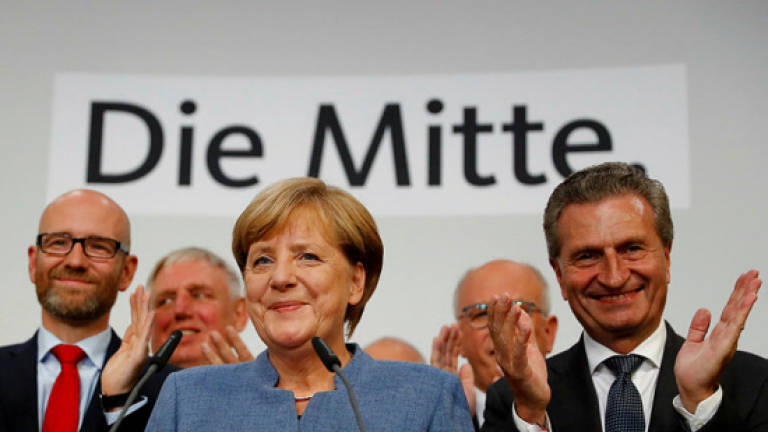Merkel seeks partners in splintered Germany

BERLIN: Chancellor Angela Merkel got down to work Tuesday in the fractured political landscape left by Germany's "earthquake" election, seeking a ruling majority to help neutralise a newly empowered hard right.
Merkel huddled with her conservative deputies in the Bundestag, the lower house of parliament, where their CDU/CSU group saw its seats axed to 246 from 309 after its worst poll showing in seven decades.
Also at the glass–domed Reichstag parliament building for the first time were the 93 deputies of Alternative for Germany, a party branded far right by many German officials and media outlets.
"The language of the campaign is different than the one in parliament," one of the party's leading members, Alexander Gauland, told reporters outside the main chamber.
"We know that we have a big responsibility in parliament, also to our voters."
Gauland, a CDU defector, had sparked outrage ahead of the election with incendiary comments, including urging Germans to be "proud" of their World War II veterans.
But even as the AfD aimed to show it was ready for the national stage, one of its co–leaders, Frauke Petry, spoiled the celebration.
A day after stunning the political scene by saying she would not join with the AfD's parliamentary group due to "dissent" with more hardline colleagues, she announced Tuesday that she would quit the party.
Petry will serve as an independent MP but for now took no other defectors in the Bundestag with her, though several AfD deputies in state legislatures said they would leave their party's parliamentary groups.
Infinitely more complicated
In Sunday's election, the AfD poached support from both mainstream camps, the conservatives as well as the Social Democrats (SPD), who were junior partners in the "grand coalition" that has led Germany for eight of Merkel's 12 years in power.
According to opinion polls, most of those voters pointed to anger over Merkel's border policy, which allowed more than one million asylum seekers into the country since 2015.
Pressure mounted on Merkel within her party, with a conservative wing urging her to step down as party chief.
"It is important for there to be a new impulsion, for the party to no longer be ruled from the chancellery," said Alexander Mitsch, who leads one of the conservative groups within the CDU.
And Volker Kauder, one of Merkel's close allies, was re–elected as the CDU's parliamentary group chief with just 77.3% of the vote, sharply down from the over 90 percent he has consistently received since 2005.
Beyond her own ranks, Merkel faces an infinitely more complicated search for a governing alliance after the SPD ruled out further cooperation with her after the party's humiliating score of 20.5 percent, a post–war record low.
From Bavaria to 'Jamaica'?
Commentators said Tuesday that Merkel's only other option — seeking a deal with the pro–business Free Democrats (FDP) and the ecologist Greens — would be fraught with risks.
The grouping has been dubbed a Jamaica coalition, since the parties' colours would match those of the Caribbean nation's flag.
Germans seem to be warming to the idea, with a poll by the independent Infratest Dimap institute showing 57 percent support.
But strong ideological differences could hinder the alliance.
"There are many booby traps among the issues for a possible Jamaica coalition," Juergen Falter, a professor of political science at the University of Mainz in western Germany, told the Bild newspaper.
He noted that the Christian Social Union (CSU), the Bavarian sister party of Merkel's CDU and a frequent critic of her asylum policy, had its back to the wall after suffering particularly heavy losses in the election.
With a poll looming in Bavaria next year, Falter said the CSU's stance on immigration was likely to harden, which could put any deal with the Greens in particular out of reach.
The CSU's new chief whip Alexander Dobrindt said the conservatives would need to get their own house in order before talking to potential partners.
"The CSU group sees its role as fighting for those who have felt left behind in the past," he said in an overture to AfD voters.
Merkel has also pledged to try to address AfD supporters' concerns, but without ceding to far–right demands.
Meanwhile the Greens and the FDP are far apart on issues including deepening EU integration, military spending and the response to the diesel crisis, given Germany's outsize dependence on the automotive industry.
Merkel has said she hopes to have a new government in place by Christmas, but the right–leaning Die Welt daily warned that a stalemate could spark new elections.
Few expect coalition talks to start in earnest until after a snap poll on Oct 15 in the state of Lower Saxony state, home to Volkswagen. — AFP